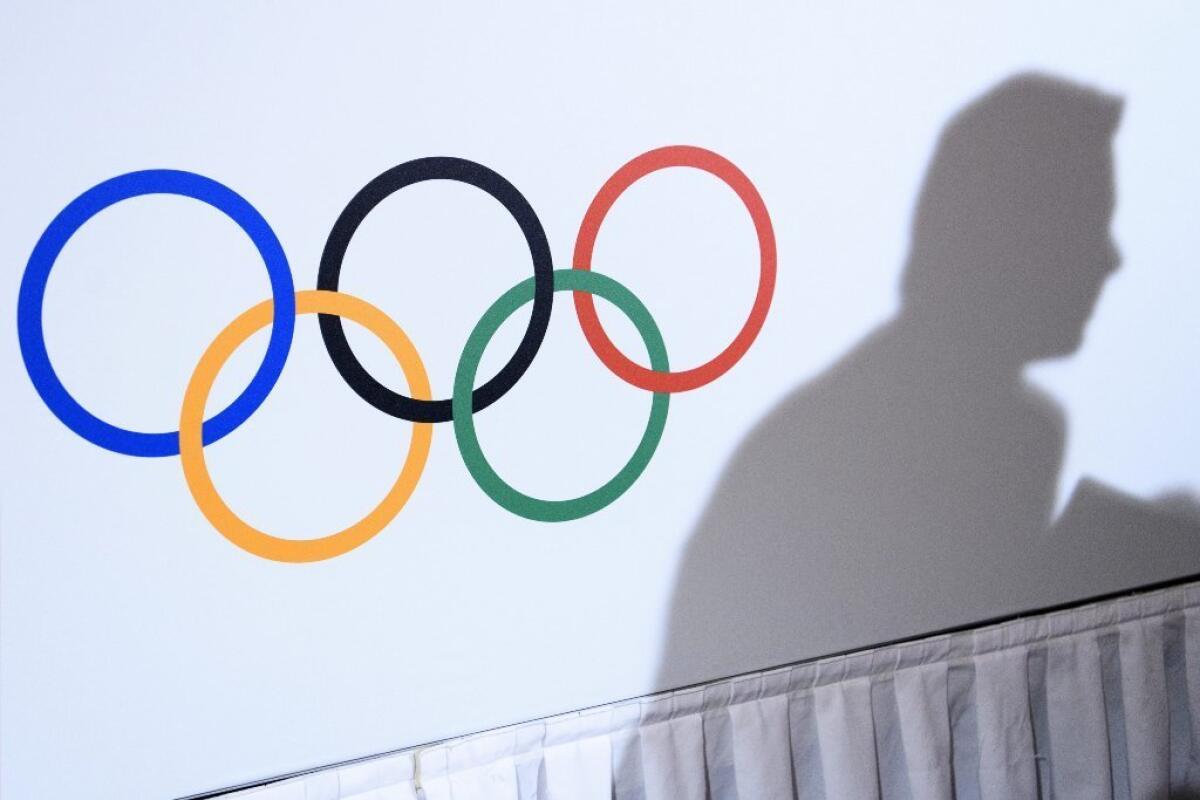Trump’s travel ban could impact IOC vote on 2024 Summer Olympics host, but other factors also will be considered

Los Angeles isn’t the only city whose bid for the 2024 Summer Olympics has recently bumped up against politics.
While the global debate over President Trump’s travel ban has heightened concerns that International Olympic Committee members might turn away from L.A., problems have arisen in Budapest.
Bid leaders in the Hungarian capital announced over the weekend that they will delay the final stage of their campaign while a political youth organization continues to gather signatures for a potential referendum.
“We have always welcomed debate and discussion around our bid,” the bid committee said in a statement.
Even Paris — seen as a slight favorite in the three-city race — could face pushback as Marine Le Pen, head of the far-right National Front party, runs for president on an anti-immigration platform.
While IOC members have long insisted that sport should exist independently from politics, the headlines keep intruding on their Games, raising questions about what might happen when they gather in September to select a host for 2024.
What matters most to IOC voters?
That is the million-dollar question and a subject of much speculation. Even well-paid consultants who make their living advising bid cities acknowledge that they can never be quite sure how an upcoming selection will turn out.
To some extent, the Olympic movement exists in a bubble; many IOC members are former athletes who have spent their lives focused on sport.
So politics are not necessarily at the top of their list and they certainly have never hesitated to award the Games to countries such as Russia and China, where human rights are an issue.
Some IOC voters who double as officials in specific sports might be more concerned with picking a host that provides their events with the best possible venue.
Others might see the Games from a wider perspective, looking for the city that will put on the best show or help market the Olympic movement to a broader audience.
The fact is, the 90 or so members expected to cast votes in September come from all over the world, from all walks of life, and have a wide range of priorities.
Have politics impacted votes in the past?
Consider recent examples: Beijing won the 2008 Summer Olympics despite widespread concerns over freedom of expression in China and Sochi staged the 2014 Winter Games amid a global controversy about gay rights in Russia.
In bidding for the 2012 Games, New York had to deal with President George W. Bush and the globally unpopular war in Iraq. Yet, when London was chosen to host those Summer Games, many experts believed another factor had far greater impact.
At the time, IOC members were unhappy with the terms of a deal they thought shared too little of the massive U.S. broadcast revenues with the rest of the world.
Finances, not politics, were perceived as the sticking point. And when Chicago failed in a subsequent bid for 2016, U.S. Olympic Committee officials agreed to rework the revenue-sharing arrangement.
So which is it this time: politics or money?
The answer: a little of both.
As veteran Olympic journalist Philip Hersh pointed out in his Globetrotting blog, Trump’s decision to back out of the Trans-Pacific Partnership could have real economic impact in countries where numerous IOC members reside.
An aggressive stance on China by Trump and his choice for secretary of State, Rex Tillerson, come at a time when the Asian power has increasingly close ties with the IOC.
Olympic leaders recently signed a long-term sponsorship deal with Chinese e-commerce giant Alibaba that is reportedly worth $800 million. Beijing will hold the 2022 Winter Games.
As for the political element, IOC President Thomas Bach spoke last summer about the plight of refugees, bemoaning a “world of selfishness where certain people claim to be superior to others.”
His comments coincided with Trump’s campaign proposals to temporarily ban Muslim immigration and deport millions of other immigrants living in the U.S. illegally. Now, those proposals have started to become reality.
So what’s the bottom line for L.A.?
Bach wasn’t the only one talking at the 2016 Summer Olympics in Rio de Janeiro last August.
LA 2024 leaders heard grumbling from IOC members who think of their global organization as inclusive; they did not like Trump’s positions on immigration, international trade and NATO.
And if those members need a reason to vote against the U.S., they have a good one in hand.
Paris has put forth a bid that — much like L.A.’s — would eliminate billions in construction by making use of existing stadiums and arenas. The mega-sporting event might have a more compact feel; L.A.’s proposal spans from Santa Monica to the Inland Empire.
Also, 2024 marks 100 years since Paris last hosted the Games in 1924, so returning would make for a nostalgic story line.
The U.S. bid could make the argument that a potential second Trump term would be nearly over by 2024, but that doesn’t change the present situation.
And when IOC members make their selection next summer, they will vote in secret — the IOC insists on confidentiality to protect its members from outside pressure.
We may never know what, if any, impact Trump’s presidency will have on L.A.’s chances.
So far, it probably hasn’t helped.
Follow @LAtimesWharton on Twitter
Go beyond the scoreboard
Get the latest on L.A.'s teams in the daily Sports Report newsletter.
You may occasionally receive promotional content from the Los Angeles Times.




